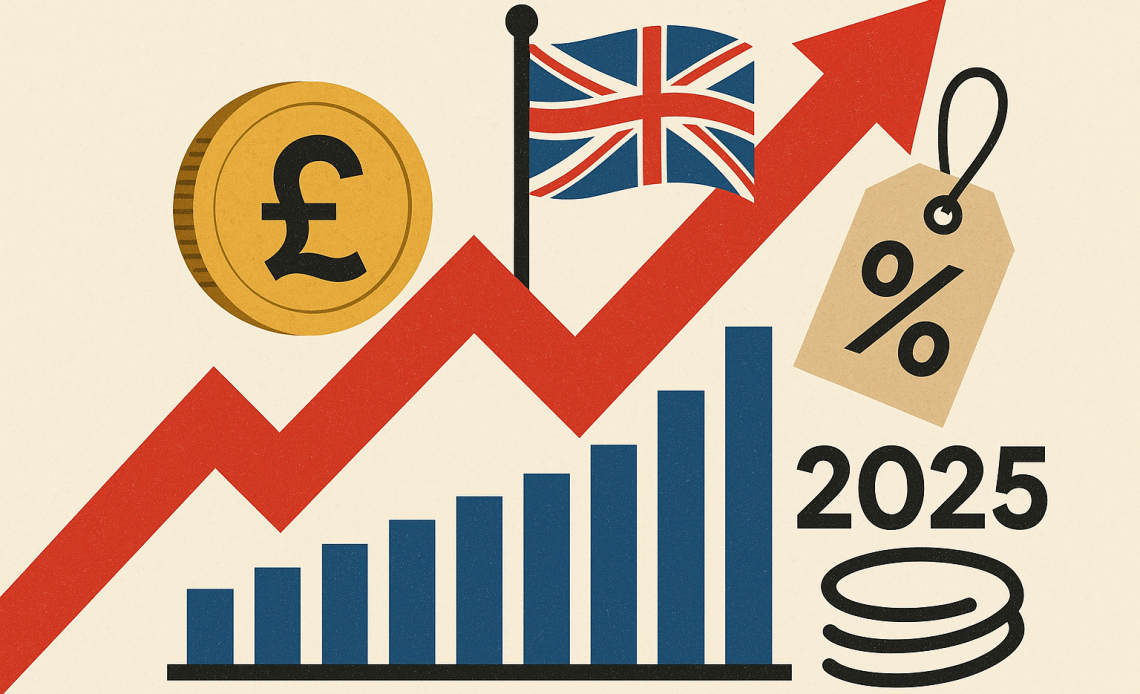The UK is set to experience the highest inflation among the G7 economies in 2025, according to new forecasts from the Organisation for Economic Co-operation and Development (OECD).
The Paris-based body expects consumer prices in Britain to rise 3.5% this year, compared with 2.5% in 2024.
Inflation will remain above the Bank of England’s 2% target into 2026.
The OECD’s report comes at a time when Chancellor Rachel Reeves faces pressure to address a large fiscal gap, with the prospect of more tax rises in November as government borrowing grows.
OECD forecasts show the UK at the top of the G7 inflation chart
The OECD projects UK inflation will be 3.5% in 2025, above 3.1% in Japan, 2.7% in the US, 2.2% in Germany, 2% in Canada, 1.9% in Italy, and 1.1% in France.
This places Britain at the top of the G7 group for consumer price increases.
By 2026, UK inflation is expected to ease to 2.7%, still the second highest in the G7 after the US.
The organisation noted that while inflation has slowed in many parts of the world, including the Eurozone, price pressures remain persistent in the UK.
The Bank of England held its base rate at 4% last week, citing continued concerns about inflationary pressures, even as global inflation trends begin to ease.
Rising costs put pressure on households and businesses
The Office for National Statistics (ONS) reported that inflation stood at 3.8% in August, unchanged from July and still almost double the Bank of England’s target.
Key contributors included energy and utility bills, with electricity, gas and other fuel costs up 9.3% year-on-year, and water supply charges rising more than 26%.
Food and drink prices also increased by 5.1% in August, up from 4.9% in the previous month.
In a letter to the Treasury after the Bank of England’s recent vote, governor Andrew Bailey highlighted the impact of higher payroll taxes and minimum wage increases on labour costs.
The £25 billion rise in employer national insurance contributions, announced in the October 2024 Budget, has added further strain to company expenses.
Household inflation expectations in the UK and the US are described by the OECD as “high by historical standards”, with wage growth rising faster than levels considered compatible with official targets.
UK growth forecast and the fiscal challenge for the government
Despite inflation risks, the OECD forecast UK GDP growth of 1.4% in 2025, up from 1.1% the year before, making it the second-fastest among G7 countries after the US.
However, growth is expected to slow to 1% in 2026, lagging behind the US, Canada and Germany.
Chancellor Rachel Reeves is preparing a challenging Budget in November as she works to close a fiscal gap estimated at more than £20 billion.
Reeves has committed to ensuring that day-to-day government spending is fully funded through tax revenues by 2029-30.
The OECD warned that tax increases, coupled with higher trade costs and continuing policy uncertainty, could drag on demand.
The post OECD warns UK inflation to outpace G7 peers amid tax and price pressures appeared first on Invezz







